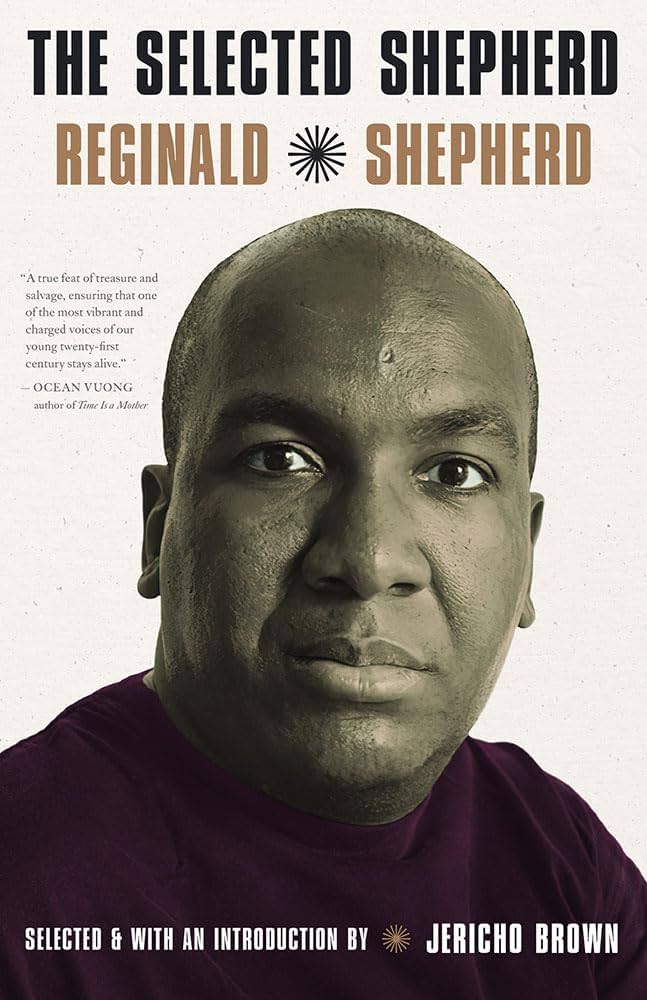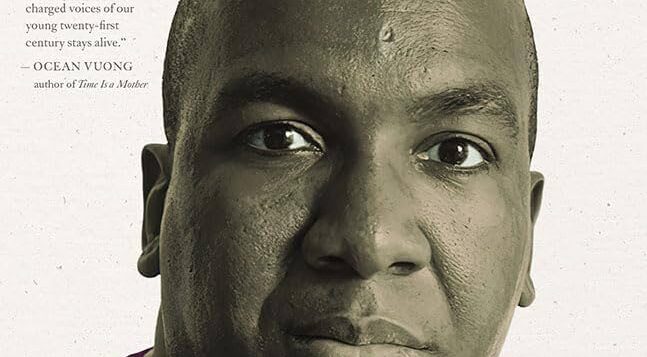 THE SELECTED SHEPHERD: Poems
THE SELECTED SHEPHERD: Poems
by Reginald Shepherd
Edited by Jericho Brown
Univ. of Pittsburgh. 168 pages, $30.
A NEW COLLECTION titled The Selected Shepherd is a very welcome arrival that may encourage readers to rediscover an award-winning, fiercely intelligent poet, anthologist, and critic. Gone much too soon at the age of 45, Reginald Shepherd showed in his increasingly stronger collections that he was well on his way to becoming a major force in American poetry.
Born in New York in 1963 and raised in tenements and housing projects in the Bronx, Shepherd went on to hold two Masters of Fine Arts degrees, from Brown and the University of Iowa. He published five poetry collections in his lifetime, all from the University of Pittsburgh Press.* He also edited two anthologies, The Iowa Anthology of New American Poetries and Lyric Postmodernisms, and his work seemed to pop up everywhere: in numerous anthologies, journals, and four editions of the annual Best American Poetry series. His poem “Pleasure” appeared in the Jan.-Feb. 2003 issue of this magazine. Shepherd was a visiting professor at the University of West Florida, living in Pensacola with his partner Robert Philen, when he died of colon cancer in 2008.
Judiciously selected by Pulitzer Prize winner Jericho Brown, The Selected Shepherd contains poems from all five of his books and from the posthumous collection Red Clay Weather (2011). Often studded with lyrics, allusions to other poets and poems, Greek myths, parenthetical asides, clarifications, and reversals, his poems were often characterized as “difficult” by critics. Shepherd, however, felt “that most poetry isn’t hard enough, in the sense that it’s not interesting or engaging enough. It doesn’t hold the attention—you read it once or twice and you’ve used it up. That engagement I look for and too often miss is a kind of pleasure, in the words, the rhythms, the palpable texture of the poem. It’s the opposite of boredom.” Brown’s perceptive introduction makes a persuasive case for Shepherd’s poetry. He discusses the poet’s unmistakable voice and the three major concerns throughout his poetry: the beauty of an endangered natural world, grief over the loss of his mother when he was fourteen, and his erotic love for and attraction to white men.
Before going further, let me disclose that I wrote the encyclopedia entry on Reginald Shepherd for Greenwood Publishing Group’s LGBTQ America Today (2008), and he and I occasionally emailed each other. His substantial messages were always friendly and warm, usually about poetry, of course, and what was happening in his life. He was honest about having health challenges, but never let on exactly how serious his illnesses were. I regret not thinking to save them. Reginald also got a certain amount of pleasure in beginning and ending messages with our shared first name.
A number of the poems and numerous lines in The Selected Shepherd have been with me since I first read them: the opening movement of “The Difficult Music” from his debut Some Are Drowning; the word- and sound-play in “Littler Sonnet” (Wrong); “Self-Portrait in the New World Order” (from the post-9/11 Fata Morgana); and especially “The Gods at 3 AM” (Angel, Interrupted), with its perfect evocation of being unpartnered in a gay bar, where everyone but you is beautiful and desired:
The gods don’t say hello, and when you ask them
How they are the gods say they don’t know, the gods
Are drunk and don’t feel like talking now, but you
Can touch their muscled backs when they pass.
“Don’t try/ to say you didn’t know the gods are always white, the statues/ told you that,” Shepherd writes later in “Gods.” His wrestling with mixed feelings about white men sometimes upset and divided his readers—particularly Black readers—over the poet himself and his work. For example, publishing a multi-layered Jeffery Dahmer poem (“Hygiene”) that doesn’t explicitly condemn its subject and even implicates the poet himself—“Every white man on my bus home looks/ like him, what I’d want to be destroyed/ by, what I want to be”—did not help Shepherd’s case with these critics.
Notes Brown in his introduction: “Shepherd was always clear about the troubles made by whiteness and about the fact that whiteness always arrives wearing empire and capitalism as its clothes. That clarity is made all the more complex and fraught with the fact that he is also always clear about his desire for white men.” It was that complexity combined with his curiosity about and questioning of himself and the world at large, without any clear resolution, that added to the difficulty of his poems for some readers.
Like Jericho Brown, I also looked forward to each collection, wanting “to know how his poems would refute and expand the practices of his previous work.” In the year of his demise, Shepherd wrote in his blog the following about his poetry and his reason for writing it (April 4, 2008):
My poetry operates within a literary tradition and a literary language to which I owe my formation as a writer, yet which is not “mine” (as a black gay man raised in Bronx housing projects): I wrestle with this necessary angel and rise renamed, blessed but also lamed. … It’s my intention to inscribe my presence into that language and that tradition, not to “subvert” it but to produce a place of possibility within it. I wish to make Sappho and the South Bronx, the myth of Hyacinth and the homeless black men ubiquitous in the cities of the decaying American empire, AIDS and all the beautiful, dead cultures, speak to and acknowledge one another, in order to discover what, if anything, can be made of a diminished thing (in Robert Frost’s phrase).
* The five titles are: Some Are Drowning (chosen by Carolyn Forché for the Associated Writing Programs Award in Poetry); Angel, Interrupted; Wrong; Otherhood (finalist for the Lenore Marshall Poetry Prize); and Fata Morgana(winner of the Silver Medal of the 2007 Florida Book Awards). Shepherd was also the author of Orpheus in the Bronx: Essays on Identity, Politics, and the Freedom of Poetry, with a second collection, A Martian Muse, appearing posthumously in 2010.
Reginald Harris, a writer and poet based in Brooklyn, is the author of Ten Tongues (2003) and Autogeography (2013).






